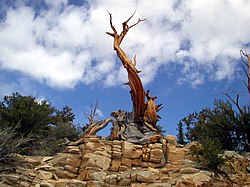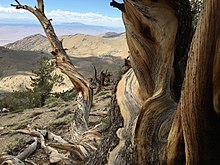Ancient Bristlecone Pine Forest
Geography
The forest is east of the Owens Valley, high on the eastern face of the White Mountains in the upper Fish Lake-Soda Spring Watershed, above the northernmost reach of the Mojave Desert into Great Basin ecotone. The forest's mountain habitat is in the Central Basin and Range ecoregion (EPA) and Great Basin montane forests (One Earth). The Patriarch Grove is the source of Cottonwood Creek, a designated Wild and Scenic River.
Ecology

The Great Basin bristlecone pine (Pinus longaeva) trees grow between 9,800 and 11,000 feet (3,000–3,400 m) above sea level, in xeric alpine conditions, protected within the Inyo National Forest. Limber pine (Pinus flexilis) also grow in the forest.
Methuselah
The Methuselah Grove in the Ancient Bristlecone Pine Forest is the location of the "Methuselah", a Great Basin bristlecone pine that is 4,856 years old. It is considered to be the world's oldest known and confirmed living non-clonal organism. It was temporarily superseded by a 5,062 year old bristlecone pine discovered in 2010. In May 2017 however, Dr. Peter Brown removed this tree from his database of old trees because the tree and core sample could not be found. "Methuselah" is not marked in the forest, to ensure added protection from vandals.
Visiting

The Ancient Bristlecone Pine Forest is generally open from mid-May through the end of November, weather permitting.
- Schulman Grove and Schulman Grove Visitor Center – daily interpretive talks and natural history lectures mid-June through Labor Day, and hiking trails.
- Patriarch Grove – home of the world's largest bristlecone pine, the Patriarch Tree, and a self-guided nature trail.
Methuselah Grove trail
The Methuselah Grove trail starts from the visitor center at 9,846 feet (3,001 m) and makes a 4.5-mile (7.2 km) loop that includes the side valley of the Methuselah Grove where the oldest tree lives, a high section looking out eastward over Nevada's basin-and-range region, and side trails to old mining sites. Numbered natural-history markers are explained by a booklet.
Fire
On September 4, 2008, an arsonist set fire to the Schulman Grove Visitor Center and several bristlecone pines. The building and all the exhibits within were destroyed. Activities to rebuild the center began the next day and are now complete.
References
- ^ Miller, Leonard. "The Ancient Bristlecone Pine". The Bristlecone site. Archived from the original on September 4, 2010. Retrieved September 10, 2010.
- ^ "Discovery". Archived from the original on August 28, 2010.
- ^ Bryce, S. A.; et al. "Ecoregions of Nevada" (poster). Reston, Virginia: USGS. Retrieved January 12, 2020.
- ^ Noss, Reed. "Great Basin Montane Forests". One Earth. Retrieved December 12, 2023.
- ^ Inyo N.F.-Bristlecone Forest Archived July 28, 2011, at the Wayback Machine . accessed August 30, 2010
- ^ NFS: Bristlecone Natural History Archived July 28, 2011, at the Wayback Machine . accessed August 30, 2010
- ^ "Pinus longaeva". Gymnosperm Database. March 15, 2007. Archived from the original on May 17, 2019. Retrieved January 4, 2015.
- ^ "Rocky Mountain Tree-Ring Research OldList". Archived from the original on April 12, 2013. Retrieved January 6, 2013.
- ^ SCHLOSSBERG, TATIANA (April 22, 2016). "Celebrate Earth Day With a 4,800-Year-Old Tree (If You Can Find It)". The New York Times. NY Times. Archived from the original on April 23, 2016. Retrieved April 22, 2016.
- ^ "Fire claims Ancient Bristlecone Pine Forest visitor center". Los Angeles Times. September 6, 2008. Archived from the original on September 18, 2008.
- ^ Woods, Tom (April 10, 2009). "Arson Charges for Schulman Visitor Center Fire". Archived from the original on November 14, 2013. Retrieved January 27, 2012.
- LaMarche Jr., Valmore C; Hirschboeck, Katherine K (1984). "Frost rings in trees as records of major volcanic eruptions". Nature. 307 (5947): 121–126. Bibcode:1984Natur.307..121L. doi:10.1038/307121a0. S2CID 4370382. Retrieved September 10, 2010.-